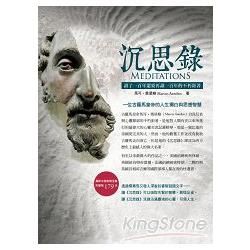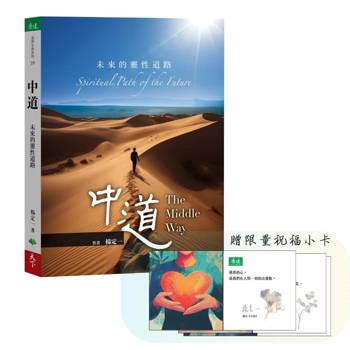| FindBook |
有 5 項符合
沉思錄:讀了一百年還要再讀一百年的不朽鉅著的圖書 |
| 圖書選購 |
| 型式 | 價格 | 供應商 | 所屬目錄 | 電子書 |
$ 90 |
個人成長 |
二手書 |
$ 135 |
二手中文書 |
$ 157 |
中文書 |
$ 158 |
西方哲學 |
$ 161 |
哲學 |
|---|
| 圖書館借閱 |
| 國家圖書館 | 全國圖書書目資訊網 | 國立公共資訊圖書館 | 電子書服務平台 | MetaCat 跨館整合查詢 |
| 臺北市立圖書館 | 新北市立圖書館 | 基隆市公共圖書館 | 桃園市立圖書館 | 新竹縣公共圖書館 |
| 苗栗縣立圖書館 | 臺中市立圖書館 | 彰化縣公共圖書館 | 南投縣文化局 | 雲林縣公共圖書館 |
| 嘉義縣圖書館 | 臺南市立圖書館 | 高雄市立圖書館 | 屏東縣公共圖書館 | 宜蘭縣公共圖書館 |
| 花蓮縣文化局 | 臺東縣文化處 |
|
|
圖書介紹 - 資料來源:Readmoo 評分:
圖書名稱:沉思錄:讀了一百年還要再讀一百年的不朽鉅著
透過樸素平實而又發人深省的睿智話語文字,
讀《沉思錄》可以吸取先賢智慧,感悟反省,
讓《沉思錄》有不可思議的魅力,引領人生。
這部不朽鉅著是古羅馬皇帝奧理略自我反省與心靈探索的精華,是他對人類有史以來所進行的最偉大的心靈交流記錄。他是一個比他的帝國更完美的人,然而,他的勤奮工作並沒有挽救古羅馬,但是他的《沉思錄》卻成為西方歷史上最感人的偉大名著。
有史以來最偉大的作品之一,美國前總統柯林頓、英國前首相布雷爾、法國前總統密特朗、二戰時期英國首相邱吉爾等國際領導人都在看的枕邊書。
|












